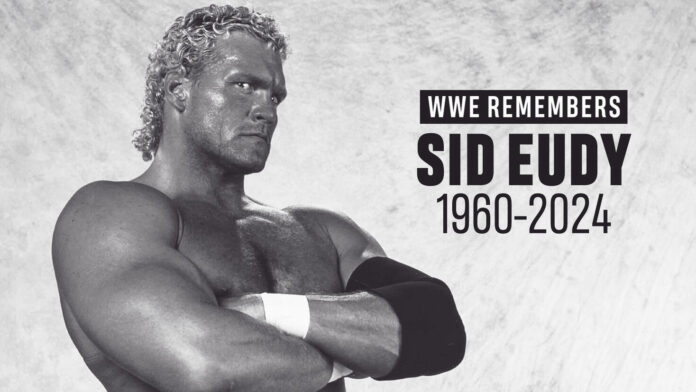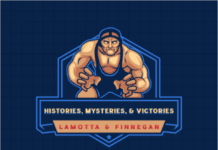
Sid Eudy, known for his memorable career inside the ring ropes under variations of his real name, passed away at the age of 63 yesterday after a battle with cancer, according to a post by his son on social media.
Breaking in under a mask in the Memphis territory, Sid Vicious is a unique case, even for the unique genre that is the professional wrestling industry. Standing close to 6’10, Eudy quite literally stood out in a world of eccentric and over-the-top personas. The aura that he had as he walked to the ring with his menacing frame, often proclaiming to be, “the ruler of the world” through clinched teeth, was only matched by his mysterious business choices outside of it.
Make no mistake about it, in a cosmetic business, the look of Psycho Sid seemed like it was built to print money. In fact, he portrayed his later “unbalanced” persona so well that went you take into account some of the backstage tales around his career, you have to wonder if he actually was unbalanced outside of the ring.
Perhaps, it was those business choices or disagreements in some cases that kept him from being a bigger star, despite the rather brief runs that he had at the top of both major companies throughout the 90s.
After less than two years in Memphis, he inked a deal with World Championship Wrestling in 1989, working with Dan Spivey as one half of The Skyscrapers. By definition, Sid was a puppy with big paws so to speak, as just a few years experience led to some absolutely brutal squash matches that saw Sid potato some of the jobbers, although you never got the impression it was intentional. During this era of his career, he had an undistinguished run as a member of The Four Horseman at a time when total lack of direction under Jim Herd prompted WCW to attempt to try to repackage a faction that had prior success.
Without a firm direction in WCW, Sid opted to explore his chances in the WWF, debuting with the organization in mid-1991. In some ways, his relatively short WCW tenure allowed WWF brass to get a glimpse of the potential that he could bring to the table. Sid Justice was put into the mix relatively quickly and worked with the top names in the company. It’s important to put this scenario into the proper context, this was during the era when the “big four” pay-per-views really shaped the direction of the entire year, with the crescendo at Wrestlemania and usually that momentum had some type of effect on the card at Summer Slam. Sid was less than a year into his WWF stint when he played a key role in the finish of the Royal Rumble in 1992, which saw Ric Flair win the vacant championship, to set up a WM main event match against Hulk Hogan a few months later. Reportedly, Sid failed a drug test and decided to leave the company because of a disagreement with management for how the failed test should be handled.
In many ways, this situation was a microcosm of Sid’s career, as despite main event exposure, he didn’t stay anywhere long enough to truly cement himself as a top-tier guy, and that scenario happened on a few different occasions throughout his career.
After almost a year out of the spotlight, Sid resurfaced in World Championship Wrestling in the spring of 1993, but was only there a few months, as that October the infamous scissor incident happened with Arn Anderson during a tour of England. The story has become one of the urban legends of the industry and what did or didn’t happen depends on who you ask. Ironically, in the years that followed the incident, neither wrestler had much to say negatively about the other. Regardless of how exactly the argument started or who stabbed who with the pair of scissors, Sid was released from his WCW deal because of the incident.
By early-1995, Sid was back in the WWF, but an injury later in the year sidelined his progress. It became a running joke around his career, but supposedly, when Sid was on the injured list at home, he often enjoyed playing softball. When he was back in action in 1996 under the “Psycho” Sid moniker, this was probably the biggest run of his career, albeit just as brief as most of the others. He won the WWF title when he dethroned Shawn Micheals at the Survivor Series. He went on to main event his second Wrestlemania the following year when he dropped the title to The Undertaker. Reports of a neck injury saw him leave the company just three months later.
Despite the fact that he was in the main event of Wrestlemania in 1997, suggesting that he could’ve cashed in on the notoriety, Sid spent 1998 with only a handful of independent appearances before he made a few surprise cameos in ECW in early-1999. On one hand, “Psycho” Sid could’ve worked really well in the environment of extreme, but he was a businessman first, and there’s nothing wrong with that. Paul Heyman simply wasn’t going to be able to talk him into waiting months to get paid so by mid-1999, he landed once again in WCW.
Similar to the rest of his career, he immediately became a main event player in WCW, winning the heavyweight title by early-2000, but the ship was sinking so it’s doubtful that Sid or anyone else was going to turn the company around during his last run there. At the Sin pay-per-view in 2001, Sid suffered an absolutely horrific leg injury during the main event that essentially ended his career. He made a handful of wrestling appearances in the decade after that, including a memorable cameo on Raw in 2012, but the serious leg injury ended his career when he probably still had a few years of full-time wrestling left in the tank.
The sum total of Sid’s career was that he was undoubtedly a great attraction just not a polished in-ring worker, which was exposed when he had to work on weekly television during the latter portion of his career, as opposed to the house show format earlier. Basically, the more you saw him, the less impressive he was, which is probably one of the reasons he didn’t stay in one place long enough to ever get stale. As much as miscalculated business decisions led to short stints, there was always a demand to see him back in the fold because each jump gave him a fresh start to cash-in on such an impressive look and performance. Sid’s character and performance were authentic and believable, which was why he was a main event guy almost his entire career. Again, he didn’t stay anywhere long enough to true get a solid run as the top guy, but he was always booked around the main event talent, which is why he was one of the most memorable performers of that era.
What do you think? Share your thoughts, opinions, feedback, and anything else that was raised on Twitter @PWMania and Facebook.com/PWMania.
Until next week
-Jim LaMotta
E mail [email protected] | You can follow me on Instagram, Facebook, & Threads @jimlamotta89







